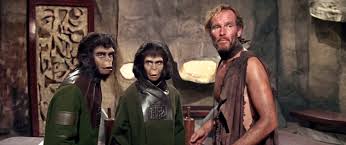Planet of the Apes (1968)

Planet of the Apes (1968) – A Sci-Fi Masterpiece That Defined a Genre
Introduction
Released in 1968, Planet of the Apes remains one of the most influential science fiction films of all time. Directed by Franklin J. Schaffner and based on the novel La Planète des singes by Pierre Boulle, the film presents a dystopian vision of a world where apes have evolved into the dominant species while humans have regressed into primitive beings. Starring Charlton Heston as the defiant astronaut George Taylor, the film explores deep philosophical themes, political allegories, and a twist ending that has since become one of the most iconic in cinematic history. This review delves into the various aspects of the film that made it a groundbreaking success, from its thought-provoking narrative to its revolutionary makeup effects and cultural impact.
Plot Overview
Planet of the Apes follows a group of astronauts led by Taylor (Charlton Heston), who crash-land on an unknown planet after a long space voyage. Struggling to survive in a harsh desert landscape, they soon encounter a society dominated by intelligent apes, including chimpanzees, orangutans, and gorillas. The apes have established a strict caste system: the chimpanzees are scientists and intellectuals, orangutans serve as religious and political leaders, while gorillas function as soldiers and enforcers.
Taylor is captured and placed in a scientific research facility, where he befriends two sympathetic chimpanzees, Dr. Zira (Kim Hunter) and Cornelius (Roddy McDowall). As he struggles to prove his intelligence to the ape society, he faces opposition from Dr. Zaius (Maurice Evans), an orangutan who seeks to suppress the truth about the planet’s history. Through a series of shocking revelations, Taylor discovers that the planet is, in fact, a post-apocalyptic Earth, devastated by nuclear war.
Themes and Symbolism
One of the film’s greatest strengths lies in its exploration of profound social and political themes. Planet of the Apes is a cautionary tale about the dangers of nuclear war, the misuse of science, and the oppressive nature of hierarchical societies. The movie also serves as an allegory for racial discrimination and the consequences of human arrogance.
The Fall of Human Civilization
The film’s climactic twist ending, where Taylor stumbles upon the ruins of the Statue of Liberty, drives home its central warning about nuclear annihilation. This moment transforms the entire narrative into a grim reflection on mankind’s self-destruction, forcing audiences to confront the terrifying reality that human civilization is not invincible.
Science vs. Religion
A major conflict in the film arises between the scientifically curious chimpanzees and the dogmatic orangutans, led by Dr. Zaius. This mirrors real-world debates between science and religion, particularly in areas such as evolution and historical revisionism. Dr. Zaius, as both a scientist and a religious leader, symbolizes the suppression of inconvenient truths to maintain societal stability.
Racism and Class Struggles
The apes’ rigid class structure, where orangutans hold power, chimpanzees act as progressives, and gorillas serve as brute enforcers, reflects real-world issues of racial and social inequality. The way humans are treated as inferior beings mirrors historical instances of slavery and systemic discrimination, making the film a powerful critique of racial injustice.
Performances and Characters
Charlton Heston delivers a powerful performance as Taylor, portraying a cynical yet determined astronaut who refuses to be dehumanized by the ape society. His journey from arrogance to despair is compelling, and his final realization about Earth’s fate is one of the most memorable moments in film history.
Kim Hunter and Roddy McDowall bring depth to their roles as Zira and Cornelius, providing the film with a sense of hope and intellectual curiosity. Maurice Evans as Dr. Zaius presents a complex antagonist who, despite his rigid stance, genuinely believes he is protecting his society from dangerous knowledge.
Groundbreaking Special Effects and Makeup
One of the most revolutionary aspects of Planet of the Apes was its pioneering use of prosthetic makeup, designed by John Chambers. The film’s realistic ape costumes allowed actors to convey nuanced emotions, setting a new standard for practical effects in Hollywood. This innovation was so influential that Chambers received an honorary Academy Award for his groundbreaking work.
Cinematography and Direction
Franklin J. Schaffner’s direction enhances the film’s immersive experience, utilizing wide landscapes and stark imagery to create an unsettling, alien world. The film’s cinematography, led by Leon Shamroy, effectively captures the desolate yet majestic landscapes, reinforcing the story’s themes of isolation and discovery.
The Iconic Twist Ending
The film’s conclusion, where Taylor finds the half-buried Statue of Liberty, remains one of the most shocking moments in cinematic history. This twist not only recontextualizes the entire film but also delivers a chilling message about humanity’s potential for self-destruction. The image of a ruined monument to freedom and democracy serves as a haunting symbol of mankind’s downfall.
Cultural Impact and Legacy
Planet of the Apes spawned a massive franchise, including four sequels in the 1970s, a 2001 remake directed by Tim Burton, and a reboot trilogy beginning with Rise of the Planet of the Apes (2011). The original film’s themes continue to resonate in modern storytelling, influencing countless sci-fi works, from Star Wars to The Matrix.
Additionally, the film introduced memorable quotes such as “Take your stinking paws off me, you damn dirty ape!” which has since become a pop culture staple.
Conclusion
Planet of the Apes (1968) is more than just a sci-fi adventure; it is a thought-provoking exploration of society, power, and the consequences of human folly. With its compelling performances, groundbreaking effects, and timeless themes, the film remains a masterpiece that continues to inspire and captivate audiences. Whether viewed as a thrilling sci-fi epic or a cautionary tale about humanity’s future, Planet of the Apes stands as one of the greatest films ever made.